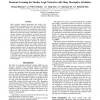56 search results - page 9 / 12 » Axiomatic First-Order Probability |
119
Voted
SYNTHESE
2010
15 years 1 months ago
2010
We discuss several features of coherent choice functions – where the admissible options in a decision problem are exactly those which maximize expected utility for some probabil...
108
Voted
APAL
2002
15 years 2 months ago
2002
The paper introduces a semantics for the language of classical first order logic supplemented with the additional operators and . This semantics understands formulas as tasks. An ...
134
Voted
IJAR
2010
15 years 1 months ago
2010
The logical and algorithmic properties of stable conditional independence (CI) as an alternative structural representation of conditional independence information are investigated...
147
Voted
AAAI
2006
15 years 4 months ago
2006
DTGolog, a decision-theoretic agent programming language based on the situation calculus, was proposed to ease some of the computational difficulties associated with Markov Decisi...
136
Voted
AAAI
2010
15 years 4 months ago
2010
Many machine learning applications that involve relational databases incorporate first-order logic and probability. Markov Logic Networks (MLNs) are a prominent statistical relati...

